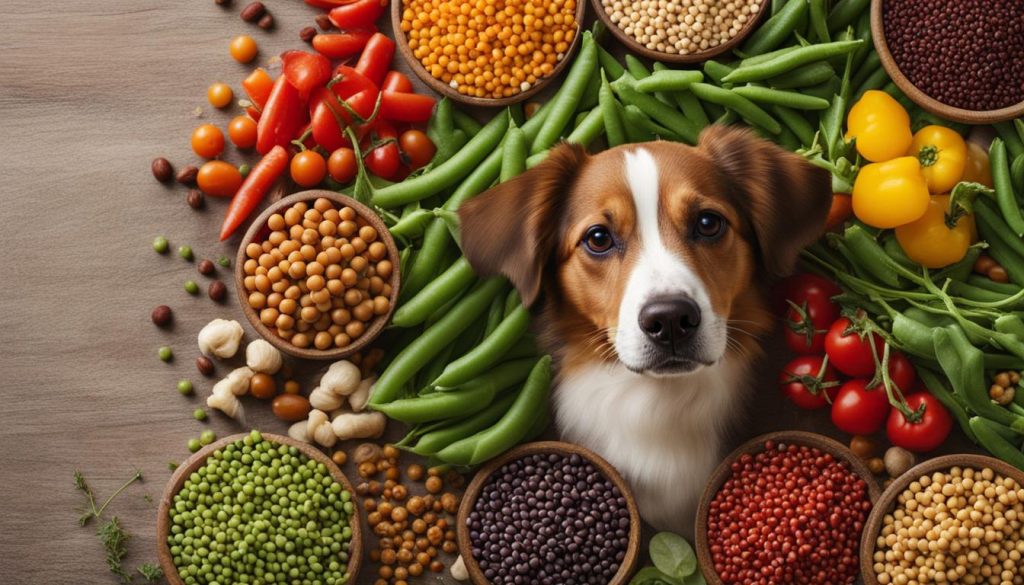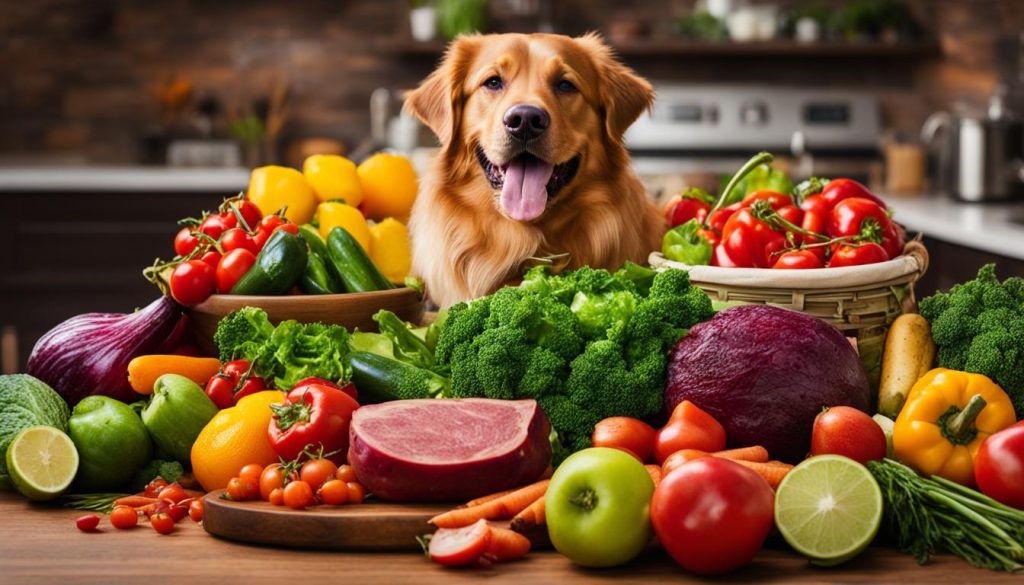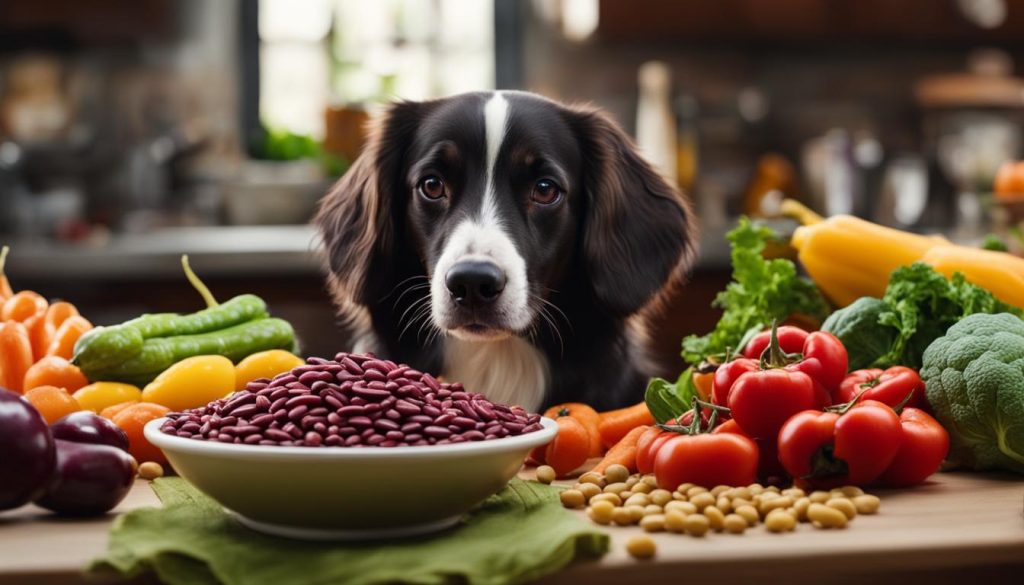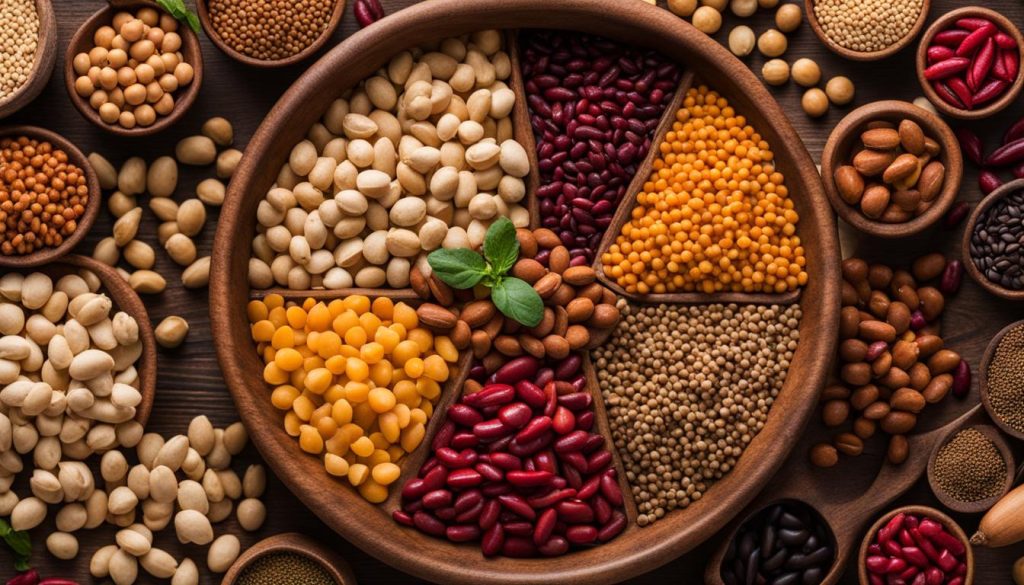As a professional in the field of veterinary care, I often get questions about what foods are safe for dogs to consume. One common query that arises is whether dogs can eat kidney beans. In this article, I will provide you with a comprehensive guide to the topic, covering everything from the nutritional benefits of kidney beans for dogs to the precautions and risks associated with feeding them.
Key Takeaways:
- Kidney beans can be safely consumed by dogs in moderation as part of a balanced diet.
- They provide protein, fiber, and antioxidants that are beneficial for dogs.
- Raw kidney beans are toxic to dogs and should never be fed to them.
- Cooked kidney beans should be served plain, without any added seasonings or ingredients.
- Feeding kidney beans in moderation helps avoid gastric upset and excessive gas in dogs.
Nutritional Benefits of Kidney Beans for Dogs

Kidney beans offer various nutritional benefits for dogs. They are a good source of plant-based protein, fiber, vitamins, and minerals. The antioxidants found in kidney beans help boost the immune system and fight free radicals. The high fiber content aids in digestion and promotes healthy bowel movements. Kidney beans are also low in calories, making them a suitable option for dogs on a weight-loss diet. However, it’s important to remember that dogs primarily require protein from animal sources, so kidney beans should only be included as part of a balanced diet.
The Nutritional Content of Kidney Beans
| Nutrient | Amount per 100g |
|---|---|
| Protein | 8.7g |
| Fiber | 6.4g |
| Vitamin C | 1.4mg |
| Vitamin K | 8.3mcg |
| Iron | 2.6mg |
| Potassium | 405mg |
As shown in the table, kidney beans are a good source of protein, fiber, iron, and other essential nutrients. However, the serving size for dogs should be much smaller than 100g, as kidney beans should only be fed in moderation. It’s also crucial to cook the beans thoroughly and serve them plain, without any added seasonings or ingredients.
While kidney beans can provide nutritional benefits to dogs, it’s always best to consult with a veterinarian before introducing them to your dog’s diet. Veterinarians can provide personalized recommendations based on your dog’s specific needs and ensure that their diet remains balanced and nutritious.
Precautions and Risks of Feeding Kidney Beans to Dogs
When it comes to feeding kidney beans to dogs, there are a few important precautions and risks to be aware of. Raw kidney beans contain a toxin called Phytohemagglutinin, which can be harmful to dogs if consumed. This is why it’s crucial to cook kidney beans thoroughly before serving them to dogs. The cooking process helps deactivate the toxin and makes the beans safe for canine consumption. It’s also important to serve kidney beans plain, without any added seasonings or ingredients, as these can be harmful to dogs.
Cooking kidney beans thoroughly is crucial to make them safe for dogs. Raw kidney beans contain a toxin that can be harmful to canines.
Another consideration when feeding kidney beans to dogs is moderation. While kidney beans can provide nutritional benefits, overfeeding them can lead to gastric upset and excessive gas in dogs. It’s best to feed kidney beans in moderation and monitor the dog’s reaction. If you notice any signs of digestive upset or food allergies, it is important to adjust the serving size accordingly. Additionally, certain types of beans, such as baked beans and refried beans, should be avoided due to the added sugars, spices, and ingredients that can be harmful to dogs.
In summary, while kidney beans can be a beneficial addition to a dog’s diet when prepared correctly and fed in moderation, it’s important to be aware of the potential risks and take necessary precautions. Cooking kidney beans thoroughly, serving them plain, and avoiding overfeeding are essential for the safety and well-being of dogs. By following these guidelines and consulting with a veterinarian, you can ensure that kidney beans are included in your dog’s diet in a safe and healthy manner.
Dog-Friendly Legumes: Safe Foods for Dogs

When it comes to incorporating legumes into a dog’s diet, there are several options that are safer and more suitable than kidney beans. These dog-friendly legumes provide nutritional benefits without the potential risks associated with kidney beans. Here are some recommended types of beans for dogs:
1. Green Beans
Green beans are a great option for dogs. They are low in calories and high in fiber, making them a healthy addition to a dog’s diet. Green beans can help with digestion, weight control, and bowel regularity. They can be served cooked or raw, as long as they are cut into small, manageable pieces for dogs to chew.
2. Black Beans
Black beans are another safe and nutritious legume for dogs. They are packed with protein, fiber, and essential nutrients. Black beans can support muscle growth and repair, promote a healthy coat, and aid in digestion. It’s important to cook black beans thoroughly and serve them plain without any added seasonings or ingredients.
3. Pinto Beans
Pinto beans are a good source of plant-based protein for dogs. They are also rich in fiber, vitamins, and minerals. Pinto beans can provide energy, support a healthy immune system, and promote overall well-being in dogs. Like other legumes, pinto beans should be cooked thoroughly and served plain.
Remember, while these legumes are generally safe for dogs, it’s essential to introduce them gradually into their diet and monitor their reaction. Consulting with a veterinarian is always recommended to ensure that a dog’s diet meets their specific nutritional needs and health requirements.
How to Safely Prepare Kidney Beans for Dogs

When it comes to feeding kidney beans to dogs, proper preparation is key to ensure their safety and digestion. Here are some steps to safely prepare kidney beans for your four-legged friend:
Soaking and cooking
Start by soaking the dried kidney beans in water overnight. This helps remove lectins, which can be harmful to dogs. After soaking, drain the beans and cook them thoroughly. Boiling them in water until they are soft and easily mashed is the best way to ensure that they are safe for your dog to eat.
Plain and mashed
It’s important to serve kidney beans to your dog plain, without any added seasonings or ingredients. Seasonings such as salt, spices, and high-fat oils can be harmful to dogs and should be avoided. Additionally, mashing the beans before serving them can make them easier for your dog to chew and digest.
Incorporating into meals
Kidney beans can be mixed with your dog’s regular dry food or served separately as a treat. However, it’s essential to remember that moderation is key. Start with small amounts and gradually increase the serving size based on your dog’s individual tolerance and reaction. It’s also important to monitor your dog for any signs of digestive upset or food allergies and adjust the serving size accordingly.
| Safe preparation steps for kidney beans: |
|---|
| Soak dried kidney beans in water overnight to remove lectins |
| Cook beans thoroughly by boiling until soft and easily mashed |
| Serve kidney beans plain, without any added seasonings or ingredients |
| Mash the beans before serving to make them easier to chew and digest |
| Start with small amounts and gradually increase serving size based on your dog’s tolerance |
| Monitor your dog for any signs of digestive upset or food allergies |
By following these steps, you can safely prepare kidney beans for your dog and incorporate them into their diet as a nutritious addition.
Moderation and Serving Size for Dogs

When it comes to feeding kidney beans or any other type of beans to dogs, moderation is key. Dogs should start with small amounts and gradually increase based on their individual tolerance and reaction. It’s important to remember that serving size will depend on the size and weight of the dog. For small dogs, such as Yorkies or Chihuahuas, a teaspoon of cooked beans mixed into their regular food can be a starting point. Larger dogs, like Great Danes or Saint Bernards, can tolerate around 1/2 cup of cooked beans in their food dish. However, it’s essential to monitor the dog for any signs of digestive upset or food allergies and adjust the serving size accordingly.
It’s crucial to note that while kidney beans can provide nutritional benefits, they should not be the main source of protein in a dog’s diet. Dogs primarily require high-quality animal protein for optimal health. Therefore, kidney beans should only be included as part of a balanced diet. It’s always best to consult with a veterinarian to determine the appropriate serving size and frequency of kidney beans for your dog.
Recommended Serving Size for Dogs:
| Dog Size | Serving Size (Cooked Kidney Beans) |
|---|---|
| Small (Yorkies, Chihuahuas) | 1 teaspoon mixed into regular food |
| Medium (Beagles, Bulldogs) | 1/4 cup mixed into regular food |
| Large (Labradors, Golden Retrievers) | 1/2 cup mixed into regular food |
| Giant (Great Danes, Saint Bernards) | 1 cup mixed into regular food |
Remember that every dog is different, and individual dietary needs may vary. It’s always important to monitor your dog’s overall health, digestion, and reaction to kidney beans or any other new food. If you notice any adverse effects, such as diarrhea, vomiting, or excessive gas, it’s recommended to discontinue feeding kidney beans and consult with a veterinarian for further guidance. A veterinarian can provide personalized recommendations based on your dog’s specific needs and ensure that their diet remains balanced and nutritious.
Feeding kidney beans to dogs in moderation can offer nutritional benefits, but it’s crucial to consider serving size, individual tolerance, and overall dietary balance. Always consult with a veterinarian to ensure the safety and appropriateness of kidney beans or any other food for your dog’s diet.
Other Types of Beans to Avoid
While kidney beans can be fed to dogs in small amounts, there are certain types of beans that should be avoided altogether. These beans may pose risks to dogs’ health and should not be included in their diet. Some of the beans that should be avoided are:
- Refried beans: These beans are often high in fat and may contain harmful ingredients like garlic and spices.
- Baked beans: Baked beans usually contain added sugars and spices that can be harmful to dogs.
- Chili beans: Chili beans often have ingredients like onions, garlic, chili powder, and other spices that can be toxic and cause digestive issues in dogs.
- Canned beans: Canned beans, especially those that are high in sodium, should be avoided as they may cause health issues, particularly in dogs with heart conditions or high blood pressure.
When it comes to feeding beans to dogs, it’s best to choose plain, cooked beans without any added seasonings or ingredients. This way, you can ensure that your furry friend is getting the right nutrients without any potential harm. Always consult with a veterinarian before introducing any new foods to your dog’s diet to ensure their safety and well-being.
| Beans to Avoid | Reasons to Avoid |
|---|---|
| Refried beans | High in fat and may contain harmful ingredients like garlic and spices |
| Baked beans | Contain added sugars and spices that can be harmful to dogs |
| Chili beans | May contain toxic ingredients like onions, garlic, chili powder, and other spices |
| Canned beans | High in sodium and may cause health issues, particularly in dogs with heart conditions or high blood pressure |
Benefits of Including Beans in a Dog’s Diet

Incorporating beans into a dog’s diet can provide several benefits that support their overall health and well-being. While beans should not be the main source of protein for dogs, they can add variety, fiber, and nutrients to their meals. Some of the key benefits of including beans in a dog’s diet are:
- 1. Enhanced Nutrition: Beans are a good source of plant-based protein, fiber, vitamins, and minerals that can contribute to a dog’s overall nutritional intake.
- 2. Improved Digestion: The high fiber content in beans can aid in digestion and promote healthy bowel movements.
- 3. Weight Control: Beans are low in calories and can be a suitable option for dogs on a weight-loss diet.
- 4. Immune System Support: The antioxidants found in beans help boost the immune system and protect against free radicals.
- 5. Blood Sugar Regulation: The complex carbohydrates in beans have a low glycemic index, which can help regulate blood sugar levels in dogs.
By incorporating beans into a balanced diet, dog owners can provide additional nutritional benefits and variety for their furry companions. However, it’s important to remember that every dog is different, and it’s essential to consult with a veterinarian before making any significant changes to a dog’s diet. A veterinarian can provide personalized recommendations based on the dog’s individual needs, health conditions, and dietary requirements.
The Importance of Consulting a Veterinarian
When it comes to ensuring the nutritional needs of our dogs are met, consulting with a veterinarian is crucial. Veterinarians have the expertise and knowledge to provide personalized recommendations based on a dog’s individual needs, health conditions, and dietary requirements. They can guide us in making informed decisions about including kidney beans or any other food in our dog’s diet.
Veterinarians play a vital role in ensuring that a dog’s diet remains balanced and meets all their nutritional needs. They can help us understand the proper portion sizes and frequency of feeding kidney beans or other foods to our dogs, taking into consideration their size, weight, and overall health. Additionally, veterinarians can help us identify any potential allergies or sensitivities that may arise from feeding specific foods to our dogs.
Consulting with a veterinarian is especially important if our dog has any pre-existing health conditions or specific dietary requirements. They can provide valuable guidance and ensure that our dog’s diet supports their overall health and well-being.
By consulting with a veterinarian, we can make informed decisions about our dog’s diet and ensure that they are receiving the proper nutrition they need to thrive. It’s essential to remember that every dog is unique, and their dietary needs may vary. A veterinarian’s guidance will help us navigate the complexities of our dog’s nutritional requirements and provide us with peace of mind knowing that we are making the best choices for their health.
Proper Bean Preparation for Dogs

When it comes to feeding beans to dogs, proper preparation is key. Follow these guidelines to ensure the beans are safe and beneficial for your canine companion:
- Soak and cook the beans: Start by soaking dried beans overnight in water. This helps remove lectins, which can be harmful to dogs. After soaking, cook the beans thoroughly to make them safe for consumption. Avoid using canned beans, as they may contain preservatives and added salt that can be harmful to dogs.
- Mash up the beans: Before serving the beans to your dog, it’s best to mash them up. This makes them easier to chew and digest, reducing the risk of any digestive upset.
- Avoid seasonings and ingredients: Dogs should only be served plain, cooked beans. Avoid adding any seasonings, spices, salt, or high-fat oils, as these can be harmful to dogs.
- Consult a veterinarian: It’s always a good idea to consult with a veterinarian before introducing any new food to your dog’s diet. They can provide personalized recommendations based on your dog’s individual needs and ensure that the beans are suitable for your furry friend.
By following these guidelines, you can safely incorporate beans into your dog’s diet and provide them with additional nutrients and variety.
Benefits of Including Beans in a Dog’s Diet
Including beans in your dog’s diet can offer several benefits:
- Plant-based protein: Beans are a good source of plant-based protein, which can help support muscle growth and repair.
- Fiber: The high fiber content in beans can aid in digestion and promote regular bowel movements.
- Nutrients: Beans are packed with essential vitamins and minerals that contribute to overall health and well-being.
- Weight management: Beans are low in calories and can be a suitable option for dogs on a weight-loss diet.
However, beans should not replace the main source of protein in your dog’s diet. They should be included as part of a balanced meal plan, and the majority of protein should come from animal sources. Consult with a veterinarian to determine the appropriate amount of beans to include in your dog’s diet based on their specific needs.
| Bean Type | Nutritional Benefits | Recommended Amount |
|---|---|---|
| Green beans | Rich in fiber, vitamins, and minerals. Low in calories. | Small to medium-sized dogs: 1-2 tablespoons Large dogs: 1/4 to 1/2 cup |
| Black beans | Good source of protein and fiber. Contains antioxidants. | Small to medium-sized dogs: 1-2 tablespoons Large dogs: 1/4 to 1/2 cup |
| Lima beans | High in fiber and folate. Contains essential minerals. | Small to medium-sized dogs: 1-2 tablespoons Large dogs: 1/4 to 1/2 cup |
| Pinto beans | Good source of protein, fiber, and iron. | Small to medium-sized dogs: 1-2 tablespoons Large dogs: 1/4 to 1/2 cup |
When introducing beans to your dog’s diet, start with small amounts and monitor their reaction. If any digestive upset or allergies occur, discontinue feeding beans and consult with a veterinarian.
The Role of Beans in a Dog’s Diet
Beans can play a beneficial role in a dog’s diet, providing additional nutrients and variety. While they should not be the main source of protein for dogs, incorporating beans into a balanced diet can offer several advantages. Beans are a good source of plant-based protein, fiber, vitamins, and minerals that can support overall health and well-being in dogs. They can contribute to weight management, aid in digestion, boost the immune system, and help regulate blood sugar levels.
Please be aware that every dog is unique, and their dietary needs may vary. Consulting with a veterinarian is essential to ensure that a dog’s diet meets all nutritional requirements and aligns with their specific health needs. A veterinarian can provide personalized recommendations based on factors such as the dog’s age, breed, size, and any existing health conditions. They can guide pet owners on the appropriate serving sizes and frequency of feeding beans to a dog. Additionally, veterinarians can help identify any potential allergies or sensitivities that may arise from feeding certain foods, including beans, to dogs.
Benefits of Including Beans in a Dog’s Diet:
- Plant-based protein: Beans offer an alternative source of protein for dogs, supporting muscle growth and repair.
- Fiber: The high fiber content in beans aids in digestion and promotes healthy bowel movements.
- Nutrient-rich: Beans contain various vitamins and minerals essential for a dog’s overall health and well-being.
- Weight management: Beans are low in calories and can be included in a weight-loss diet for dogs.
- Variety and flavor: Adding beans to a dog’s meals can diversify their diet and make it more enjoyable.
When introducing beans to a dog’s diet, it’s important to start with small amounts and gradually increase based on the dog’s tolerance and reaction. Monitoring the dog for any signs of digestive upset or food allergies is crucial. It’s also essential to properly prepare beans by soaking them overnight and cooking them thoroughly without any added seasonings or ingredients. By following these guidelines and considering a dog’s individual needs, beans can be a safe and healthy addition to their diet.
| Type of Bean | Benefits |
|---|---|
| Green beans | Low in calories, high in fiber, and a good source of vitamins A, C, and K. |
| Black beans | Rich in antioxidants, fiber, and protein. |
| Lima beans | Contain essential minerals like potassium and iron, and provide a good source of plant-based protein. |
| Pinto beans | High in fiber, protein, and various vitamins and minerals. |
| Garbanzo beans | Good source of protein, fiber, and essential minerals. |
| Soybeans | Provide a complete source of protein, along with fiber and essential fatty acids. |
Source:
“Beans can be a beneficial addition to a dog’s diet, providing plant-based protein, fiber, and nutrients.”
Wrapping Up
To summarize, including kidney beans in a dog’s diet can be safe and beneficial when done in moderation. Kidney beans offer nutritional advantages, such as protein, fiber, vitamins, and minerals, that contribute to a balanced canine diet. However, it’s crucial to cook the beans thoroughly, serve them plain, and avoid overfeeding to prevent potential risks and digestive issues.
Consulting with a veterinarian is essential before incorporating kidney beans or any new food into a dog’s diet, especially if the dog has specific health conditions or sensitivities. A veterinarian can provide personalized recommendations based on the individual needs of the dog, ensuring a well-balanced diet that meets all nutritional requirements.
By following proper preparation methods and considering a dog’s unique needs, kidney beans can be a safe and healthy addition to their meals. Remember to prioritize the main source of protein from high-quality animal sources and use kidney beans as a supplementary nutrient option. With the right approach, dogs can enjoy the benefits of kidney beans as part of their overall dietary plan.
FAQ
Can dogs eat kidney beans?
Yes, dogs can eat kidney beans in moderation as part of a balanced diet.
What nutritional benefits do kidney beans offer for dogs?
Kidney beans provide protein, fiber, vitamins, minerals, and antioxidants that are beneficial for dogs.
Are raw kidney beans safe for dogs to eat?
No, raw kidney beans are toxic to dogs and should never be fed to them.
Can kidney beans cause gastric upset in dogs?
Yes, overfeeding kidney beans can lead to gastric upset and excessive gas in dogs.
What are some other types of beans that are safe for dogs?
Dog-friendly legumes include green beans, black beans, lima beans, pinto beans, garbanzo beans, and soybeans.
How should kidney beans be prepared for dogs?
Kidney beans should be soaked overnight, cooked thoroughly, and served plain without any added seasonings or ingredients.
How much kidney beans can I feed my dog?
The serving size will depend on the size and weight of your dog. Start with small amounts and gradually increase based on your dog’s tolerance.
Are there any types of beans that should be avoided for dogs?
Yes, refried beans, baked beans, chili beans, and canned beans should be avoided for dogs due to added sugars, spices, and ingredients that can be harmful.
What are the benefits of including beans in a dog’s diet?
Beans can provide plant-based protein, fiber, and nutrients that support weight control, digestion, immune system function, and blood sugar regulation in dogs.
Why is it important to consult a veterinarian before feeding kidney beans to my dog?
A veterinarian can provide personalized recommendations based on your dog’s individual needs, health conditions, and dietary requirements.
How should I properly prepare beans for my dog?
Soak dried beans overnight and cook them thoroughly without any added seasonings or ingredients. Mash up the beans before serving them to your dog.
What role do beans play in a dog’s diet?
Beans can add variety, fiber, and other nutrients to a dog’s diet, but they should not be the main source of protein.






